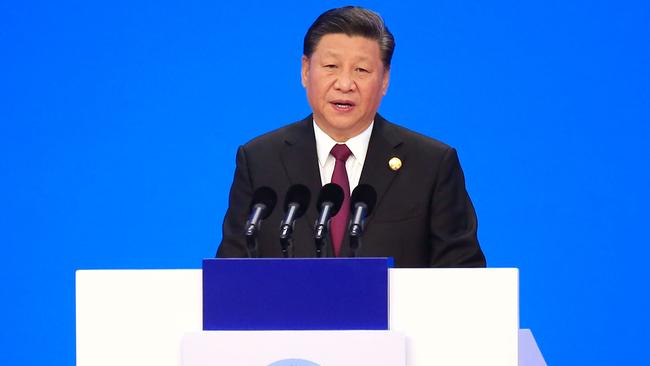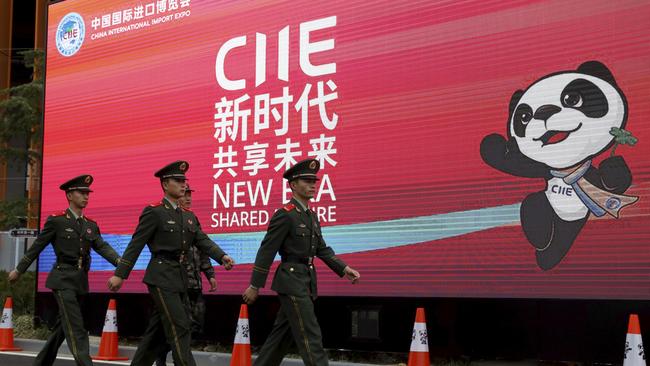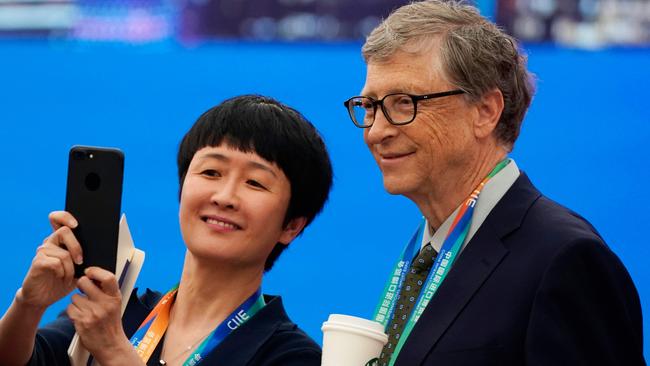China to ‘step up’ moves to open markets
Xi Jinping has vowed to open access to China’s economy while delivering a rebuke to the Trump administration over trade.

President Xi Jinping has vowed to open access to China’s economy, while delivering a veiled rebuke to the Trump administration, as he kicked off an import fair amid growing foreign accusations that his government was backtracking on reform pledges.
Mr Xi said China would seek to “step up” moves to stimulate domestic consumption of imports, lower tariffs, ease customs clearance procedures, and implement harsh punishments for intellectual property infringements.
Measures also include opening up Chinese telecommunication, education and medical services market.
“We will foster a world-class business environment,” Mr Xi said in an address opening the import fair in Shanghai meant to promote the country’s image as an importer.
However he offered no response to US and European complaints about technology policy and curbs on foreign business.
Mr Xi pushed back at the foreign pressure in comments clearly aimed at US President Donald Trump, who has launched a trade war between the world’s two largest economies.
Decrying “protectionism”, “isolationism” and confrontation, Mr Xi said countries should fix their own houses before targeting others.
“They should not just point fingers at others to gloss over their own problems,” Mr Xi said.
“They should not hold a flashlight in hand, doing nothing but highlight the weaknesses of others and not their own.”

Beijing has framed the first annual China International Import Expo as a sign of its commitment to open markets despite mounting criticism to the contrary and the worsening trade war with Washington, which has seen both sides impose punitive tariffs on billions of dollars of goods.
Warning that the world’s recovery from the global economic crisis was still “unstable”, Mr Xi said the actions of some countries would “result in stagnation and an unhealthy world economy”.
In his speech attended by world leaders and senior politicians, including federal Trade Minister Simon Birmingham, and by leading business people, he said inclusiveness and countries working together was the best way ahead for the world economy.
“All flowers in full blossom make a beautiful spring,” he said. “Openness brings progress, seclusion leads to backwardness,” he said.
Mr Xi said the world needed to “establish a set of global economic and trade rules that is fair, reasonable and transparent and promote trade and investment liberalisation to make the economy more open through greater exchanges.”
The world economy was just emerging from the shadow of the global financial crisis, he said.
“Recovery is still unstable,” he said. “There is a need for a concerted effort to foster new growth drivers.”
He pledged to stimulate imports, boost consumption, foster new areas of high end consumption, and “continue to unleash the potential of the domestic market and expand the potential for imports.”
Other measures will include reducing restrictions on foreign investment and moving towards more respect for foreign commercial law in China.
China would reduce the negative list of areas where foreigners cannot invest.
“China’s door will never be closed,” he said. “It will only open still wider.”
Organisers say more than 3000 foreign companies from 130 countries including the United States, Europe and across Asia, will put their products on display for potential Chinese buyers at the expo.
Companies in attendance include General Motors, Ford, Microsoft, Samsung, Walmart and Tesla.
The event is being attended by several foreign heads of government including Russian Prime Minister Dmitry Medvedev and Pakistani premier Imran Khan.

Mr Xi has said the expo proves China is willing to reduce its huge trade surpluses with other countries.
The run-up has triggered fresh calls for China to take actionable steps to improve a domestic playing field that critics say is skewed in favour of Chinese businesses.
It was not clear whether his pledges today will placate foreign critics. The US and EU business lobbies in China, and the French and German ambassadors to Beijing, last week called on China to use the expo to announce concrete change, saying it too often fails to deliver on promises.
Foreign businesses complain about a range of preferential policies that benefit local firms, requirements that foreign companies form joint ventures with Chinese partners, forced technology transfers, rampant intellectual property violations and restrictivered tape.
Washington has snubbed the gathering by not sending high-level representation, instead calling on China to change “unfair” trade practices.
But the lure of China remains strong and the US contingent includes even tech giants such as Facebook, which is blocked in China, and Google, which pulled out years ago over censorship and cyber-attacks.
Both are seen as eyeing new ways into China’s giant market.
Experts say the week-long expo is also a message by Beijing that, as it pivots from an export-based economy toward one relying more on the buying power of its 1.4 billion people, other countries will need to work with China if they want a piece of that action.
Microsoft founder Bill Gates will join a business forum, but the touchy optics of attending a China import expo amid trade tensions means few big-name American CEOs are confirmed.
Nevertheless, Mr Xi, today sought to underscore China’s attractiveness as a market by highlighting its population of 1.3 billion and its size as the world’s No. 2 economy.
“The Chinese economy is not a pond but an ocean,” Mr Xi said. “High winds and storms may upset a pond but never an ocean.”
With AFP, Dow Jones





To join the conversation, please log in. Don't have an account? Register
Join the conversation, you are commenting as Logout